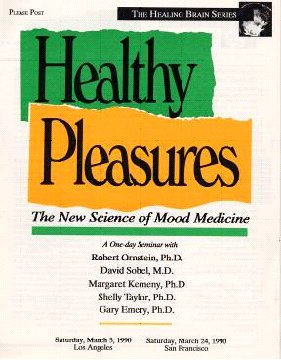Healing Brain Seminar: March 1990
THE HEALING BRAIN SERIES
Healthy Pleasures
The New Science of Mood Medicine
Saturday, March 3, 1990
Los Angeles
Saturday, March 24, 1990
San Francisco

Rediscover the Pleasure Principle!
Imagine a medical treatment that lowers blood pressure, decreases heart disease and cancer risk, boosts immune function, and blocks pain—a treatment that’s safe, inexpensive, readily available, and whose main side effect is that it makes you feel good.
It’s not a miracle drug. These and other benefits appear to come from pleasure itself. And this prescription is filled in the internal pharmacy of the brain.
Join a distinguished faculty of researchers and clinicians for an exciting (and pleasurable) day exploring the new science of mood medicine.
What you’ll learn from this seminar:
• Why pleasure and positive mood are critical to psychological and physical health
• How psychological and emotional states may affect immune function
• How to mobilize positive beliefs, expectations, and emotions
• How to blend techniques from cognitive therapy, relaxation training, and successful behavior modification practices into an effective, enjoyable health promotion program
PROGRAM
Healthy Pleasures
Robert Ornstein, Ph.D.
Evolution has equipped us with an innate guide to health. By following pleasurable sensations we are rewarded twice: immediate enjoyment and better health. The healthiest people seem to be pleasure-loving, pleasure-seeking, pleasure-creating individuals.
Robert Ornstein, Ph.D., is the President of The Institute for the Study of Human Knowledge and a writer, lecturer, and researcher in the human sciences. His books include The Amazing Brain, The Psychology of Consciousness, The Healing Brain, and Healthy Pleasures.
The Virtues of Sensuality
David Sobel, M.D.
Many people today are not getting their minimum daily requirements of sensual pleasure. Our senses not only alert us to danger, they can pleasurably guide us to better health. Learn about the health benefits of touch, looking at nature, sweet scents, saunas, siestas, tasty foods, good music and good sex.
David S. Sobel, M.D., is Director of Patient Education and Health Promotion for Kaiser Permanente Medical Care Program in Northern California. He is co-author of several books including The Healing Brain and Healthy Pleasures.
Mind-Made Immunity
Margaret Kemeny, Ph.D.
Experiencing major traumas and even the minor stresses of daily living can affect certain immune processes. Investigations in psychoneuroimmunology now suggest that positive experiences, intimate relationships, psychological interventions, and certain emotional states can enhance the immune system. Learn how the mind and the immune system talk to one another, and what this communication means to your health.
Margaret E. Kemeny, Ph.D., is Assistant Professor of Psychiatry, UCLA School of Medicine. She applies her training in health psychology and immunology to research on how emotional stress and major traumas (like earthquakes) affect the immune system.
Healthy Illusions
Shelley Taylor, Ph.D.
Somewhere we got the idea that facing the “truth” about ourselves is the best route to mental health. Yet, being unrealistically optimistic, overvaluing our skills, overestimating our sense of control, and minimizing our faults can yield surprising health benefits. Such “healthy illusions” can be fostered to help buffer people against everyday stresses, major traumas and chronic illness.
Shelley E. Taylor, Ph.D., is Professor of Psychology at UCLA. In addition to numerous scientific papers, she is the author of Health Psychology and Positive Illusions: Creative Self-Deception and the Healthy Mind.
The Pursuit of Happiness
Robert Ornstein, Ph.D.
Positive moods and happiness can have beneficial health effects. And we can learn to control our moods and increase our happiness. Discover the tricks of the mind: Why money doesn’t increase happiness, and small daily pleasures do. Why having an unhappy past can be used to boost your mood. How telling yourself a good story can improve your well-being. Why confession may be good for the body.
Mood Therapy
Gary Emery, Ph.D.
Mental health is not just the absence of problems. Happiness, positive feelings, and mental health can be fostered through cognitive therapy. Thinking creates our experience of reality, and mood determines our state of mind. So the better you feel, the better you think, and the healthier you are. Shifting from a problem-solving approach to a positive mental health focus, can help people feel better and enhance the effectiveness of health professionals.
Gary E. Emery, Ph.D., is the Director of the Los Angeles Center for Cognitive Therapy and on the clinical faculty of the Department of Psychiatry, UCLA, and the Department of Psychology, USC. In addition to numerous scientific papers he is author of the more popular books Rapid Relief from Emotional Distress, Getting Undepressed and The Power and Wisdom of Good Feelings.
